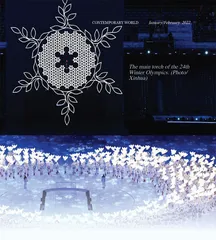Sports Diplomacy and Beijing 2022
作者: Xia Liping

Sports diplomacy plays an important role in building a community with a shared future for mankind, whose vision is highly compatible with the purposes and spirit of the Olympic movement. The spectacle of the Beijing 2022 Olympic Winter Games and Paralympic Games, a world-class platform to promote the Chinese culture and China’s governance concept and to better present the country, can help the world better understand China and contribute to the building of a community with a shared future for mankind.
Unique Role of Sports Diplomacy in Building a Community with a Shared Future for Mankind
Sport, a universal language that transcends national, religious and cultural boundaries, has become an effective tool for state-to-state exchanges and developed a new form of diplomacy, i.e. sports diplomacy. As the world is confronted with changes unseen in a century, the consensus is becoming global to build a community with a shared future for mankind, where sports diplomacy plays an indispensable role.
For starters, sports diplomacy is an effective channel to bridge the political divide between countries. Sport, a universal language that rises above national, ethnic and ideological differences, serves as a bridge of communication between countries in disagreement. The mutual visits between Chinese and Japanese Go (weiqi) delegations in the 1960s established a unique communication channel, paving the way for the normalization of diplomatic relations between the two countries. Ping-Pong diplomacy, often referred to as “the little ball moving the big ball”, thawed the ice of estrangement between China and the US for over two decades, to rise above differences and normalize relations. The marching of the combined Korean team in Sydney 2000 Olympic Games and PyeongChang 2018 Olympic Winter Games greatly contributed to the amelioration of inter-Korean relations and detente on the Korean Peninsula, speaking volumes about the strength of sports diplomacy.
In addition, sports diplomacy is an important link to promote people-to-people and cultural exchanges. Amity between the people holds the key to state-to-state relations. People-to-people exchanges together with political mutual trust and economic cooperation, the troika of China’s foreign relations, are key to the sound development of our foreign relations. In many of our bilateral high-level people-to-people exchange mechanisms, sport is one of the key cooperation areas. During the virtual meeting with President Vladimir Putin on 15 December 2021, President Xi Jinping noted that the two countries would hold the Year of Sports Exchange in the coming two years, and take the opportunity to turn sports exchange into a bridge and bond for greater mutual understanding and friendship between the two peoples.
Furthermore, sports diplomacy is a propeller to friendly relations between countries. President Xi Jinping was invited to the opening ceremony of the Sochi Winter Olympics in February 2014, a milestone in the development of China-Russia relations, as it was the first time that China’s head of state attended an international sport event held abroad. During his stay in Sochi, President Xi Jinping invited Russia to join Belt and Road Initiative. In response, President Putin immediately expressed the willingness to align its Eurasia high-speed rail project with the Belt and Road Initiative. During the meeting with IOC President Thomas Bach on 31 January 2019, President Xi Jinping noted that sports exchanges were increasingly becoming part of China’s exchanges with BRI participating countries. Sports diplomacy in diverse forms has boosted people-to-people exchanges, logistics connectivity, and information and financial flows, enhanced friendship, and raised our bilateral relations with others to a new level.
Last but not least, sports diplomacy is an important means to shape and improve the national image. A favorable national image is essential to the building of a community with a shared future for mankind. The role of sports diplomacy in shaping and improving China’s image is manifested in the following aspects. Firstly, with the involvement of the head of state, sports diplomacy can bring China closer to the world. For instance, football has its presence in many of President Xi Jinping’s state visits, which shows the image of China as a major country willing to engage, open to exchanges, and good at learning from others. Secondly, China’s participation in or organization of major sport events can help the world better understand China. Our attendance at the Los Angeles Olympics in 1984, as well as the organization of the 1990 Asian Games and 2008 Summer Olympics, seen as milestone events in presenting China as a major country, have greatly boosted the international image of China and its capital city Beijing. Thirdly, top Chinese sports stars are China’s brand names and a window for the international community to learn about China. In a 2011 hit video entitled Chinese National Image Film - People Chapter, sports stars like Lang Ping, Guo Jingjing, Yao Ming, Ding Junhui and Deng Yaping have shown to the world a dynamic China. In particular, the basketball superstar Yao Ming has won wide acclaim by foreign media and become a brand name of China among international friends especially the American people.